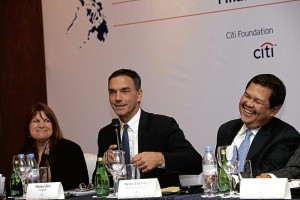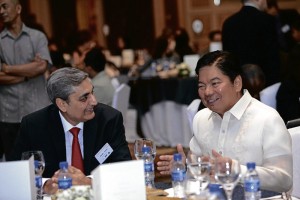Beyond ABC and 123
Michael Zink, head of Citibank for Asean and Singapore country officer, summed up succinctly the significance of the recent two-day Citi-Financial Times Financial Education Summit 2012.
In his opening remarks, Zink declared that the crisis that began in 2007 “reinforced the belief that financial literacy is no longer a ‘nice-to-have’ but rather a ‘need-to-have’ skill. It is a skill that affects the quality of life, not only for the most vulnerable segments of our communities, but of every individual regardless of age, gender or position in life.”
The point had been made earlier by Stephen Bird, Citi chief executive officer for Asia Pacific, and David Pilling, Asia editor of Financial Times in their joint message to delegates in the conference program. Bird and Pilling said the two-day summit “will aim to establish the case for financial capability as a critical competency for modern society, in both developing and developed economies, and address the fundamental challenges around impact assessment, sustainable delivery models, program standards and multisector partnerships.”
The over 280 representatives of 131 organizations from 30 countries all seemed to have completely embraced the idea embodied by the summit theme: “Financial Capability as a 21st Century Life Skill.”
For two days, participants established connections, networked, brainstormed for ways to reach those that remained outside the various programs initiated and learned from each other’s best practices.
Article continues after this advertisementStarting early
Article continues after this advertisementThe Philippines earned a lot of kudos for the initiatives Bangko Sentral ng Pilipinas (BSP) had taken so far to bring financial education to people as early as possible, starting with the primary grades.
Brandee McHale, chief operating officer and managing director of Citi Foundation, the philanthropic arm of the global bank, said during a media briefing prior to the opening of the summit that BSP “is a wonderful example” of how the public sector could support efforts to broaden the scale of financial education and reach a wider audience.
Zink mentioned that BSP, host partner of the summit, was one of the government agencies that had been driving a number of financial inclusion initiatives. He said the Philippine government had identified the empowerment of Filipino consumers, through strong consumer protection mechanisms and financial education programs, as a key reform agenda under the five-year Philippine Development Plan that began in 2011.
In his keynote address, BSP Governor Amando M. Tetangco Jr. agreed that financial capability was a life skill that could lead to a better life. He also explained why the country’s top monetary authority and supervisor of the banking system was putting resources into financial literacy.
“To us, financial education empowers people to manage their resources with prudence, instills the discipline of saving regularly and safely grow their money … financial education empowers the citizenry to become effective partners of BSP, as productive economic agents, and improves people’s lives,” he said.
Tetangco said it was not enough for BSP to craft responsive policies. “We need to communicate and educate the people on what these mean for them. On the other hand, we also need our
people to be responsible and vigilant in protecting their rights.”
Elaborating on the theme, BSP Deputy Governor Nestor Espenilla Jr. pointed out that “uninformed people were more vulnerable to scams.” He said financial education was closely linked to consumer protection.
Although Zink acknowledged that even many well-educated people did not know much about investments and other financial issues, he said financial education programs had “to reach out to people with no knowledge to begin with.” “That is why we need to reach out to students, [starting with] primary school kids, to bring them into the [financial] circle,” he said.
Exciting development
Kathy Hurley, executive vice president, education alliances, Pearson Foundation, said the Kindergarten to Grade 12 program, which the Philippines is implementing in phases to provide high school graduates enough skills to make them employable even if they do not proceed to college, “was an extremely exciting area” in terms of promoting financial literacy.
Delegates to the summit heard about different initiatives, local and international, to include financial literacy among the skills students would get out of their formal schooling.
Tetangco mentioned BSP’s partnership with the Department of Education “for the integration of lessons on saving and money management into the elementary education curriculum of our 14 million elementary students.”
He added that BSP “forged partnerships with the Bank Marketing Association of the Philippines for the development of affordable child-friendly bank products including savings account with a minimum opening balance of P100 or less than US$300.”
Zink mentioned Citi Philippines’ “Estudyantipid, a series of cable television programs that promote savings, budgeting and money management among high school students; and Money Matters for Kids, a traveling financial literacy exhibit with a companion workbook intended to attract young children.”
Sanjiv Vohra, Citi country officer, said the Money Matters for Kids, had now been transferred to BSP, gave children a very hands-on experience with topics ranging from savings and budgeting.
Vohra added Citi’s programs covered all levels of education and sectors, including those who were going to be employed for the first time.
BSP and Citibank sponsored Inquirer Learning’s “Money Matters for Teens: You Can Bank on It” series, which received this year the top prize in the Newspapers in Education (NIE) category from the World Association of Newspapers and News Publishers (WAN-Ifra) at the annual Young Reader Prize competition.
Cartoons and games
Sean Rach, regional director of brand and corporate affairs, Prudential Corporation Asia, briefed participants on Cha-Ching, which he created. Developed with Cartoon Network Asia, Cha-Ching is a financial literacy program that “helps parents develop money-smart kids.”
PlayMoolah, cofounded by Audrey Tan, is described as a “fun online platform that helps children achieve financial savvy and practice good money management skills in a fun, engaging and safe manner.” The online game, available to clients of Singapore’s OCBC bank, has features designed to encourage children to make real financial decisions and take action.

FROM left: McHale and Espenilla are amused by Zink’s (middle) response to a question from the press.
Alan Wang, executive director and cofounder of Shanghai Better Education Development Center, the first nonprofit organization in Asia dedicated to financial education for children and youth, discussed initiatives such as Making $ense of Money, Agent Penny, an Aflatoun/Aflateeen curriculum. While BSP would be awarding experienced financial literacy teachers through the annual national search for Guro ng Pag-asa (Gantimpala para sa Ulirang Pagtuturo ng Pag-iimpok at Araling Pansalapi), which it launched this year, Citi Singapore wanted them to already have the skills to teach financial literacy even before they completed their education course.
Students in the 2012-2013 school year at the National Institute of Education will be “equipped with engaging pedagogies to translate financial literacies into classrooms for primary and secondary school students by the end of their courses.”
In his closing remarks, Vohra expressed the hope that the summit established “the case that financial capability is indeed a 21st century life skill.”
But he also cautioned participants that results of their efforts would not be immediate. “Financial education is a values formation program that will take time in shifting mindsets and the beliefs people have regarding savings, wealth and money,” he said.

